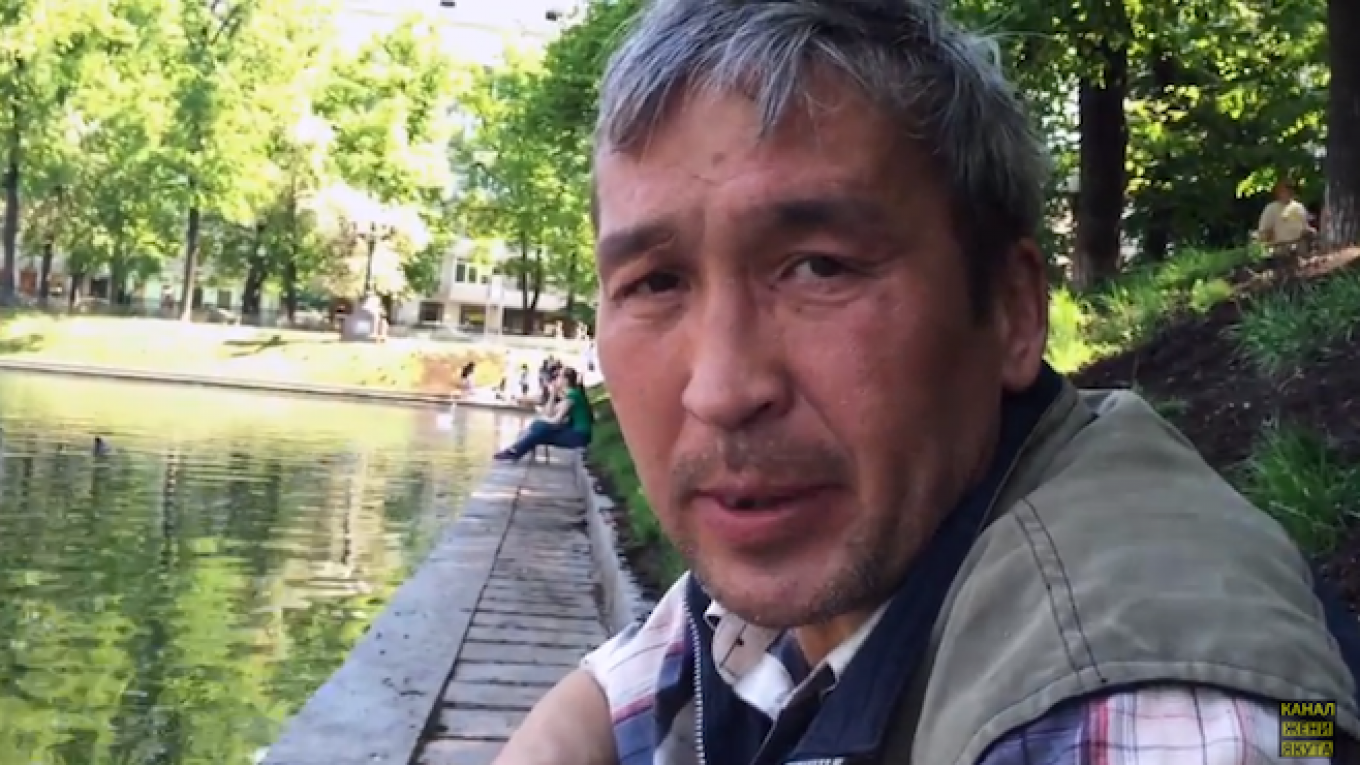A man claiming to be a "bum" living on Moscow's streets is building up an online following with his YouTube video channel and blog posts showing the underside of the city's life through the eyes of a homeless resident.
The self-identified "bum" and fledgling blogger who goes by the moniker Zhenya the Yakut — after the Yakutia region in Russia's Far East — started a YouTube channel, pledging to "show you the Moscow you have not yet seen." The channel had more than 16,000 subscribers by Tuesday, about four weeks since Zhenya the Yakut posted his first video, while the number of views garnered by his posts ranged from tens of thousands to more than 130,000.
"I will tell you about my homeless life in Moscow … where to eat for free, to sleep, to wash up, where to go, what to see," Yakut said in his initial post.
The man, who says he is 43 and has been homeless for five years, delivers on the promise in subsequent videos, starting with a tour of his sleeping quarters — down through a manhole into the underground passage of a heat pipeline, into a chamber he shares with an unidentified buddy, because "it would be boring alone."
"As you can see, I've got everything here: here's a first aid kit, here's a needle and thread, and a radio," he says. The radio failed to work, however: "The battery's dead. Well, no big deal."
The purpose of the videos is to gain subscribers and start making money through online advertising in order to finance his "dream," Yakut said, without specifying the dream.
To that end, he lures viewers with tours of a homeless man's Moscow — with a few gimmicks thrown in. At the end of his first video, Yakut said he would demonstrate his seriousness about the project by letting viewers find a $10 bill — "my savings" — that he put into a plastic bottle and stuffed inside a drainpipe in a courtyard in central Moscow, and then announced the address.
Some viewers have expressed doubts that Yakut is homeless, but the man insists he is for real. If people think he looks "too neat," it is because he has a "dress code" to follow to ensure unhindered access to public bathrooms at places like McDonald's, he said.
Filming the videos is credited to another man, identified as Andrei Voodoo, but offers little clue as to where the pair gained the technical knowledge or the equipment to create the videos and post them online.
Yakut says he completed high school and did a stint in the army, where he was decorated with a medal for valor. He said he later worked as an electrician, the man said, NVPress news portal reported. He did not specify how he became homeless.
The idea of making money through online videos and advertising came when Yakut walked into a train station to warm up and saw in the waiting lounge a television program about bloggers.
"They said it was possible to make a lot of money through a blog," Yakut was quoted as saying.
So far, he seems to be making little, but doing well with what he has. A major source of income comes from books that some Muscovites put in the trash, and which Yakut finds and takes to a used bookstore that pays "at least 10 rubles" (18 U.S. cents) per volume.
In his videos, Yakut also showed his shaving and hair-washing routine — in a public bathroom stall equipped with its own sink, inside Moscow's giant Avia Park mall, accessible by a free shuttle — and his scavenging of the city's garbage bins for things to eat or sell.
"Mushrooms," he says, opening and sniffing a jar of marinated fungi — "not good."
"Cheese," — scrutinizing a shriveled chunk, — "Not good. An umbrella. Working. Cheap, but working."
Yakut also runs a page on Russia's main social network, VKontakte, and on the Instagram photo sharing website.
His posts show the "seamy side of a bright metropolis," Yakut wrote on his VKontakte page. "There are thousands of people living and surviving here, and you can even come across such unique individuals as a bum blogger."
"Every subscriber and every click on an ad help me get closer to a normal life," he added.
A Message from The Moscow Times:
Dear readers,
We are facing unprecedented challenges. Russia's Prosecutor General's Office has designated The Moscow Times as an "undesirable" organization, criminalizing our work and putting our staff at risk of prosecution. This follows our earlier unjust labeling as a "foreign agent."
These actions are direct attempts to silence independent journalism in Russia. The authorities claim our work "discredits the decisions of the Russian leadership." We see things differently: we strive to provide accurate, unbiased reporting on Russia.
We, the journalists of The Moscow Times, refuse to be silenced. But to continue our work, we need your help.
Your support, no matter how small, makes a world of difference. If you can, please support us monthly starting from just $2. It's quick to set up, and every contribution makes a significant impact.
By supporting The Moscow Times, you're defending open, independent journalism in the face of repression. Thank you for standing with us.
Remind me later.


